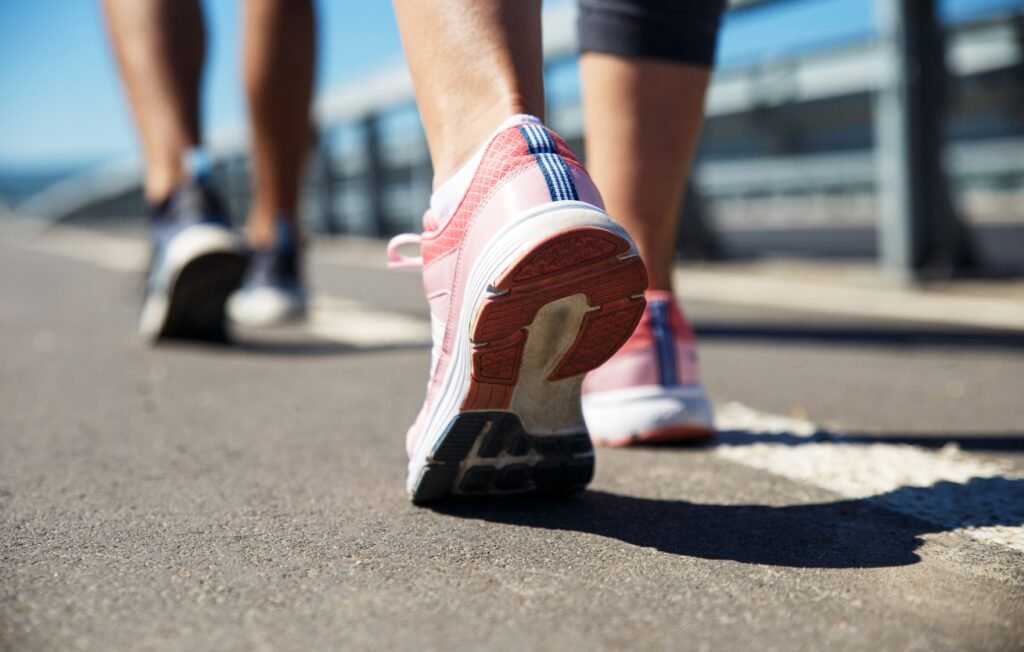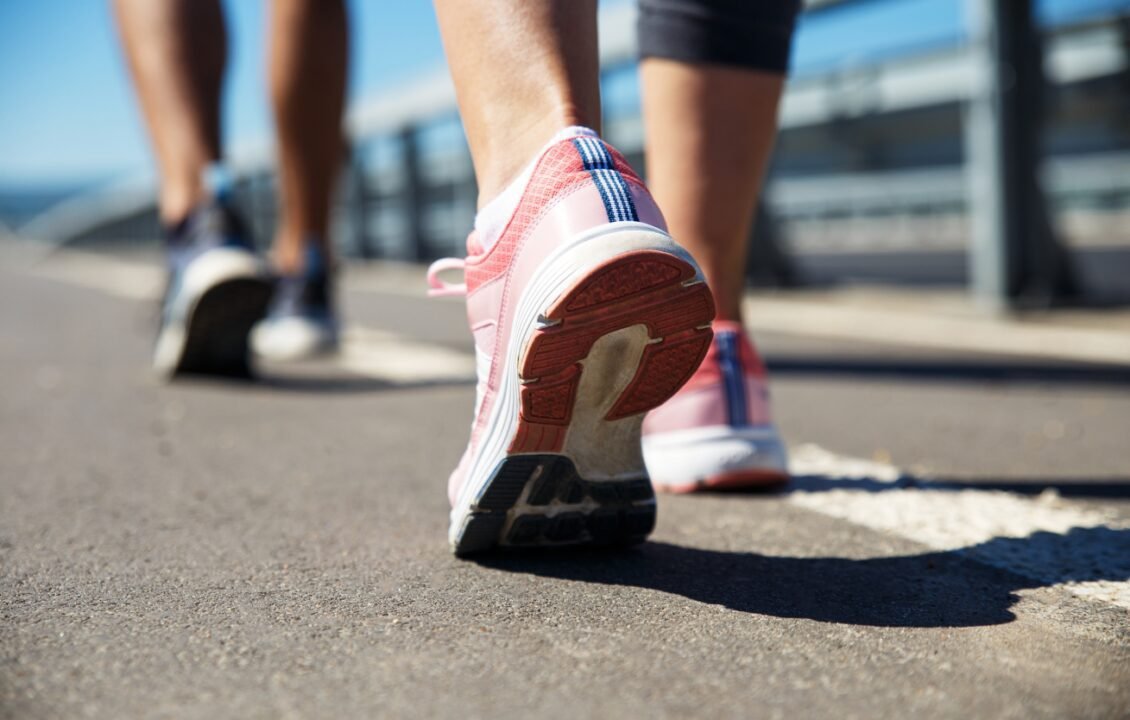Are you looking for an effective yet simple way to improve your overall health and well-being? Look no further than fast walking!
Not only is it a convenient and accessible form of exercise, but it also offers a wide range of health benefits. Whether you’re aiming to lose weight, boost your heart health, manage diabetes, enhance your mental well-being, or simply stay active, incorporating fast walking into your fitness routine can help you achieve your goals.
Key Takeaways:
- Fast walking is an easy and accessible way to improve your overall health and well-being.
- It can aid in weight loss by increasing your daily calorie burn.
- Fast walking is a great cardio exercise that promotes a healthier heart and lowers blood pressure.
- Regular fast walking can help manage diabetes by improving blood sugar control.
- It can enhance mental health and reduce stress, leading to improved mood.

Fast Walking for Weight Loss
Are you looking to shed some excess pounds?
Fast walking can be a highly effective and enjoyable way to reach your weight loss goals. By incorporating this simple and accessible activity into your daily routine, you can kickstart your metabolism, burn calories, and see real results.
One important factor to consider when using fast walking as a weight loss tool is the number of steps you take each day. Aim to gradually increase the number of steps you take per day to maximize the calorie-burning potential of your walks.
This can be easily tracked with a pedometer or a fitness tracker. By consistently achieving your recommended steps per day, you can accelerate your progress towards your weight loss goals.
“Fast walking is a low-impact activity that can be sustained for longer durations compared to higher intensity exercises. This makes it an excellent choice for individuals who want to lose weight without putting excessive strain on their joints or muscles.”
Benefits of Fast Walking for Weight Loss
- Effective Calorie Burn: Fast walking can burn a significant amount of calories, helping to create a calorie deficit necessary for weight loss.
- Increased Metabolism: Regular fast walking can boost your metabolism, allowing you to burn more calories even at rest.
- Stress Relief: Walking can alleviate stress and reduce emotional eating, contributing to weight loss success.
- Improved Cardiovascular Health: Fast walking is a form of cardio exercise that strengthens your heart and promotes a healthier cardiovascular system.
- Enhanced Overall Fitness: Incorporating fast walking into your fitness routine can improve your endurance, muscle tone, and overall physical fitness.
By adopting fast walking as a regular part of your weight loss journey, you can not only achieve your fitness goals but also experience a wide range of additional health benefits.
The best part? It’s a simple activity that you can do virtually anywhere and at any time, making it a convenient option for individuals with busy schedules.
Boosting Heart Health with Fast Walking
When it comes to improving heart health and lowering blood pressure, cardiovascular exercise is key. And one such form of exercise that can have a significant impact is brisk walking.
Studies have shown that brisk walking is an effective way to strengthen the heart muscle, improve blood circulation, and boost overall cardiovascular fitness. By increasing your heart rate and pumping more oxygen-rich blood throughout your body, fast walking helps to improve the efficiency of your cardiovascular system.
Regular fast walking has been found to reduce the risk of heart disease and stroke, as well as lower blood pressure levels. It can also help in managing other factors that contribute to heart health, such as weight management and cholesterol levels.
What makes fast walking an ideal form of exercise for heart health is its accessibility. It can be done almost anywhere and requires minimal equipment. Whether you prefer walking outdoors, on a treadmill, or in a local park, brisk walking can easily be incorporated into your daily routine.
To maximize the heart health benefits of fast walking, it is recommended to aim for at least 150 minutes of moderate-intensity aerobic activity, such as brisk walking, per week.
This can be divided into several sessions throughout the week to make it more manageable.
So, lace up your walking shoes and start boosting your heart health with brisk walking. Your heart will thank you!
Managing Diabetes through Fast Walking
For individuals living with diabetes, incorporating regular physical activity is crucial for maintaining optimal health.
Fast walking, in particular, can be an effective strategy in managing blood sugar control and overall diabetes management.
When you engage in fast walking, your muscles utilize glucose for energy, which helps to lower blood sugar levels. Regular physical activity, including fast walking, can also increase insulin sensitivity, allowing your body to use insulin more efficiently.
Walking for health is especially beneficial for individuals with diabetes because it offers a low-impact way to maintain fitness without putting excessive strain on joints.
Unlike high-intensity exercises, fast walking provides cardiovascular benefits without causing spikes or drops in blood sugar levels.
“Regular physical activity, including fast walking, can also increase insulin sensitivity, allowing your body to use insulin more efficiently.”
Additionally, fast walking promotes weight management, which is crucial for individuals with diabetes. Managing a healthy weight plays a vital role in blood sugar control and overall diabetes management.
Benefits of Incorporating Regular Walking into Your Diabetes Management Plan
- Improved blood sugar control
- Increased insulin sensitivity
- Enhanced cardiovascular health
- Weight management support
- Reduced risk of developing complications
By incorporating regular walking into your diabetes management plan, you can reap these numerous benefits and enhance your overall well-being.
Consult with your healthcare provider to create a tailored exercise routine that suits your specific needs and requirements.

Enhancing Mental Health and Reducing Stress with Fast Walking
When it comes to improving mental health and reducing stress, fast walking can be a powerful tool.
Engaging in regular brisk walks not only benefits cardiovascular health but also contributes to enhanced well-being and mood upliftment.
Outdoor exercise, such as brisk walking, allows individuals to connect with nature and enjoy the therapeutic effects of being in natural surroundings. The fresh air, greenery, and sunlight can have a rejuvenating impact on mental health, promoting a sense of calmness and tranquility.
Studies have consistently shown that physical activity, including brisk walking, releases endorphins, also known as “feel-good” hormones. These natural chemicals in the body play a key role in boosting mood and reducing stress levels.
By incorporating fast walking into your routine, you can experience an improved mood and a greater sense of well-being.
Physical activity is not only one of the most important keys to a healthy body, it is also the basis of dynamic and creative intellectual activity. – John F. Kennedy
Fast walking offers an accessible and convenient form of exercise for individuals of all fitness levels. It can be enjoyed alone or in the company of friends and family, making it a social activity that further enhances mental well-being.
Benefits of Fast Walking for Mental Health:
- Stress Reduction: Fast walking helps reduce the production of stress hormones, resulting in a calmer state of mind.
- Improved Mood: Brisk walking stimulates the release of endorphins, leading to an increased sense of happiness and contentment.
- Enhanced Cognitive Function: Regular outdoor exercise, such as brisk walking, has been linked to improved cognitive function, including enhanced memory and increased focus.
- Natural Antidepressant: The combination of physical activity, fresh air, and exposure to nature acts as a natural antidepressant, alleviating symptoms of depression.
By making brisk walking a regular part of your routine, you can proactively support your mental health and reduce stress levels, all while enjoying the benefits of being physically active.
Fast Walking as Part of Your Workout Routine
When it comes to creating a well-rounded workout routine, incorporating fast walking can be a game-changer. Not only is it a convenient and accessible form of exercise, but it also provides numerous benefits for your cardiovascular health and overall fitness.
Brisk walking, also known as fast walking, is a form of cardiovascular exercise that elevates your heart rate and gets your blood pumping. This low-impact activity puts less stress on your joints compared to high-impact exercises like running, making it suitable for individuals of all fitness levels.
To make the most of your walking routine and optimize the benefits of cardiovascular exercise, here are some strategies to consider:
1. Set Goals:
Establish specific goals for your fast walking routine, whether it’s increasing your distance, improving your pace, or reaching a certain number of steps per day. Setting clear objectives can help motivate you and track your progress over time.
2. Vary Your Intensity:
While brisk walking is a moderate-intensity exercise on its own, you can add intervals of increased intensity to challenge yourself even more. Incorporate bursts of faster walking or uphill sections to elevate your heart rate and push your cardiovascular system.
3. Incorporate Strength Exercises:
Combine your fast walking routine with strength exercises to further enhance your overall fitness. Try adding bodyweight exercises like squats, lunges, or push-ups during your walking breaks to target different muscle groups and boost your workout’s effectiveness.
4. Find Scenic Routes:
Make your fast walking routine more enjoyable by exploring different scenic routes. Opt for parks, nature trails, or beaches for a change of scenery and fresh air. Walking outdoors can also provide mental health benefits, such as reducing stress and boosting your mood.
5. Stay Consistent:
Consistency is key when it comes to reaping the benefits of any exercise routine. Aim for at least 150 minutes of moderate-intensity cardiovascular exercise, including fast walking, per week. Divide your workouts into manageable sessions throughout the week to maintain a consistent routine.
Remember, always listen to your body and consult with a healthcare professional before starting any new exercise program, especially if you have any underlying health conditions.
By incorporating fast walking into your workout routine, you can improve your cardiovascular health, burn calories, and enjoy the many benefits of walking for exercise. Whether you’re just getting started or looking to add variety to your current fitness plan, brisk walking is a versatile and effective option to consider.
Tips for Beginner Fast Walkers
If you’re new to incorporating exercise into your routine, fast walking is a great beginner exercise to get started. Not only is it simple and convenient, but it also provides numerous health benefits.
Here are some tips to help you begin your fast walking journey and gradually build your endurance:
1. Start with a Warm-Up
Before you begin your fast walk, take a few minutes to warm up your muscles and prepare your body for exercise. Try performing some dynamic stretches or marching in place to get your blood flowing.
2. Wear Comfortable Shoes
Invest in a pair of comfortable and supportive walking shoes that fit well. Good footwear is essential for preventing discomfort and reducing the risk of injury while you walk.
3. Set Realistic Goals
Start by setting realistic goals based on your current fitness level. Begin with shorter walks at a comfortable pace and gradually increase the duration and intensity as your endurance improves.
4. Maintain Proper Posture
Practice good posture while you walk to maximize the benefits of your workout. Keep your head up, shoulders relaxed, and core engaged. Swing your arms naturally and take smooth, controlled steps.
5. Listen to Your Body
Pay attention to how your body feels during your fast walks. If you experience pain or excessive fatigue, take a break or slow down. It’s important to listen to your body and avoid pushing yourself too hard, especially as a beginner.
6. Stay Hydrated
Bring a water bottle with you and stay hydrated throughout your fast walk. Drinking water before, during, and after your workout helps maintain optimal performance and prevents dehydration.
7. Monitor Your Progress
Keep track of your fast walking progress to stay motivated and see improvements over time. Use a fitness tracker or smartphone app to monitor your steps, distance, and calories burned.
8. Enjoy the Journey
Remember to enjoy the process of fast walking. Find a scenic route, listen to your favorite music or podcasts, or invite a friend to join you. Making fast walking an enjoyable part of your routine will help you stay committed and motivated.
By following these tips, you’ll be well on your way to starting your fast walking journey and reaping the many benefits of walking for exercise.
Remember to consult with your healthcare provider before starting any new exercise program, especially if you have any underlying health conditions.

Additional Benefits of Fast Walking
While weight loss and improved cardiovascular health are well-known benefits of fast walking, this form of exercise offers numerous other advantages that contribute to overall well-being.
1. Enhanced Muscular Strength and Endurance
Fast walking engages multiple muscle groups, including the legs, glutes, and core. By regularly incorporating this activity into your routine, you can strengthen and tone these muscles, improving overall physical strength and endurance.
2. Increased Bone Density
Fast walking is a weight-bearing exercise that helps stimulate bone growth and maintain bone density, reducing the risk of osteoporosis and fractures. Regular walking can be particularly beneficial for individuals at risk of bone loss.
3. Improved Joint Health
Contrary to popular belief, fast walking can actually alleviate joint pain and stiffness. The low-impact nature of this exercise reduces stress on the joints while promoting better lubrication and circulation, leading to improved joint health and flexibility.
4. Boosted Immune System
Engaging in regular brisk walking can enhance your immune system by increasing circulation, which facilitates the movement of immune cells throughout your body. This can help protect against common illnesses and infections.
5. Enhanced Cognitive Function
Fast walking has been linked to improved cognitive function and mental clarity. The increased blood flow to the brain during exercise helps enhance focus, memory, and overall cognitive performance.
6. Alleviation of Depression and Anxiety
Regular physical activity, such as fast walking, has been shown to reduce symptoms of depression and anxiety. Walking outdoors can also provide a calming effect, allowing for a break from daily stressors and promoting emotional well-being.
7. Better Sleep Quality
Engaging in regular exercise, including fast walking, can help improve sleep quality and duration. Walking promotes the release of endorphins and reduces stress, which can contribute to a more restful night’s sleep.
8.Additional Benefits of Fast Walking
Here are some other benefits of the fast walking excersises:
- Enhanced muscular strength and endurance
- Increased bone density
- Improved joint health
- Boosted immune system
- Enhanced cognitive function
- Alleviation of depression and anxiety
FAQs about fast walking
What are the health benefits of fast walking?
Fast walking, also known as brisk walking, offers numerous health benefits. It is a great form of cardio exercise that can aid in weight loss, improve heart health, lower blood pressure, help manage diabetes, enhance mental well-being, reduce stress, and promote an overall sense of well-being.
How can fast walking help with weight loss?
Fast walking can contribute to weight loss by burning calories and increasing your daily activity level. Aim for a recommended number of steps per day and gradually increase your pace to maximize the calorie-burning benefits of fast walking. It can be an effective component of achieving your fitness goals.
How does fast walking boost heart health?
Fast walking is a form of cardiovascular exercise that can strengthen your heart and improve its overall function. Regular fast walking can lower blood pressure and reduce the risk of heart disease. It is an accessible and effective way to promote heart health.
Can fast walking help manage diabetes?
Yes, fast walking can help manage diabetes by promoting better blood sugar control. Regular walking for health can improve insulin sensitivity and assist in managing blood glucose levels. It is an excellent addition to a diabetes management plan.
How can fast walking enhance mental health and reduce stress?
Fast walking has a positive impact on mental health by reducing stress levels and improving mood. Being outdoors while brisk walking can also provide a calming effect and increase feelings of well-being. It is a great way to destress and uplift your mood.
How can I incorporate fast walking into my workout routine?
Fast walking can be integrated into your workout routine in various ways. You can dedicate specific sessions to brisk walking or use it as a warm-up or cool-down for other exercises. It is a versatile form of exercise that complements different workout styles.
What are some tips for beginner fast walkers?
If you’re new to fast walking, start slowly and gradually increase your pace and distance over time. Incorporate a good warm-up and cool-down routine, wear appropriate footwear, and pay attention to your posture. Remember to listen to your body and build up your endurance at a comfortable pace.
What are some additional benefits of fast walking?
In addition to weight loss and cardiovascular health, fast walking offers other notable benefits. This form of exercise can help improve bone density, strengthen muscles, boost immune function, and increase overall energy levels. It is a holistic approach to promoting overall well-being.

Final Words
In conclusion, fast walking is a simple yet effective form of exercise that can benefit individuals of all fitness levels.
Whether you are looking to lose weight, improve heart health, enhance mental well-being, or reduce stress, incorporating brisk walking into your routine can have transformative effects on your overall health and fitness journey.
By regularly engaging in fast walking, you can burn calories, increase your cardiovascular endurance, and strengthen your heart. This low-impact exercise also plays a crucial role in managing diabetes by promoting better blood sugar control.
Furthermore, fast walking has been proven to have positive effects on mental health. It can reduce stress levels, boost mood, and provide a refreshing experience when performed outdoors.
Integrating brisk walking into your workout routine is not only an accessible option but also a form of cardiovascular exercise that can complement your other fitness activities.
Overall, fast walking offers a wide range of benefits that go beyond weight loss and physical fitness.
It provides a holistic approach to improving one’s overall well-being, making it a valuable addition to anyone’s exercise regimen. So lace up your shoes, step outside, and start reaping the rewards of this simple yet powerful activity.
